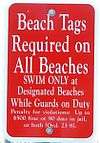Beach tag
A beach tag (also beach badge or beach token) is an admission pass that must be purchased to access a beach. It is commonly associated with the New Jersey Shore, where communities with the beach tag system restrict summer beach access to residents and visitors who pay a fee for a daily, weekly, or seasonal pass. Staff patrol the beach looking for people who are not displaying their tag, and visitors without one are asked to purchase a tag or leave. Beaches with a beach-tag program use the proceeds to offset the maintenance and staffing costs associated with running a beach, such as funding lifeguards, restrooms, and trash removal.[1]

Pricing
Daily, weekly, and seasonal tags can usually be purchased at participating beaches,[1] and each municipality sets its own rates and policies. Beaches typically do not charge for children under the age of 12 and may offer discounts to seniors.[1] In certain municipalities, discounts are given for seasonal passes purchased before a specific date (e.g., May 15 in Seaside Heights, New Jersey[2]).
Tag polemics
The goals of beach tags, or tokens, are to either restrict the beach to only community members, or to generate user fees for lifeguards and maintenance (e.g., trash removal). On the Jersey Shore, beach tags are controversial because the public trust doctrine generally gives the public the right to access the intertidal zone,[3][4] and guests may feel that a beach with beach tags should offer a superior service to free beaches.[1] Additionally, detractors debate whether beach tags are actually to restrict beach use to people who are paying visitors of hotels, beach house rentals, and local residents.[1]
The beach tag offered by one municipality does not grant access to beaches in other municipalities, because each municipality has its own rules. For example, Long Beach Island, which is about twenty miles long, comprises six municipalities, each with its own beach tags, and beach-goers cannot purchase a tag in one Long Beach Island municipality and use it in another.[1]
Proponents of beach tags suggest that they improve the cleanliness and safety of the beaches, making the tag fees akin to user fees that prevent freeloading.[5] In addition, proponents note that the beaches which require beach tags are those located in smaller municipalities, which because of beach tags are permitted to offer a similar product to the larger municipalities.[1]
New Jersey municipalities that do not enforce beach tags
The following beaches did not require beach tags as of the 2015 beach season:[1]
Other places
In Evanston, Illinois, "beach tokens" may be required for entrance to the beach for people and even pets.[6] The beach tokens are often made of metal or other durable material, to enable them to withstand swimming. The bearer may either carry them, or wear them around their neck or on their swimsuit. [7]
References
- "New Jersey Shore Guide: What Are Beach Tags?". visitnjshore.com. February 5, 2015.
- "Beach Information". Seaside Heights. Archived from the original on 2011-07-24. Retrieved 2011-03-01.
- Polis, Robert and McRae, Leslie. Back to the Beach: Bob Polis looks at surprising issues for beachgoers and beach property owners Archived July 16, 2011, at the Wayback Machine, December 1, 2005.
- Degener, Richard. Ruling expands access to beaches, Atlantic City Press, May 21, 2004.
- Smith, Shaun (November 17, 2010). "Commissioners at odds over raising beach tag fees". Shore News Today. Retrieved November 29, 2010.
- "?". City of Evanston. Archived from the original on August 4, 2008. Retrieved 13 September 2010.
- "?". City of Evanston. Archived from the original on May 2, 2008. Retrieved 13 September 2010.
External links
- "Avalon NJ: Beach Tags". powerplayrealty.com.
- "Brigantine, NJ: Beach Tags". brigantinebeachnj.com.